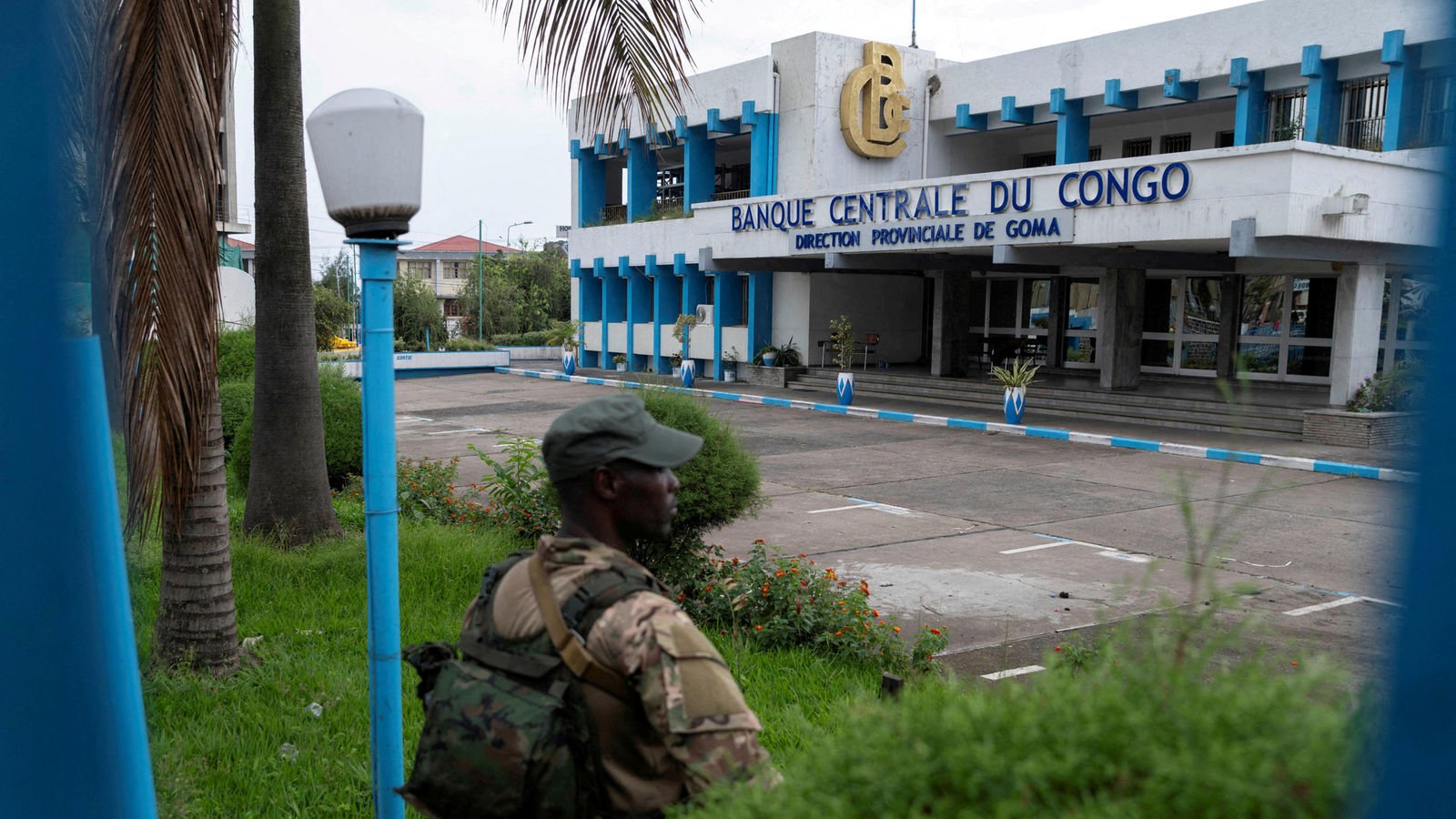
The M23 rebels’ most recent battle in Congo is to revitalize the economy
The M23 rebels, who defeated Congo’s army to seize control of the eastern region of one of Africa’s most populous countries, now have a routine yet difficult task ahead of them: governance.
Their revolt, which seeks to topple the present government in Kinshasa, the country’s capital, depends on their ability to provide stability and prosperity in the areas they already control. Their ability to succeed largely rests on their ability to revive the economies of the more than five million people who live in the seized areas.
Almost every bank is shut down. Shortages of currency are common. Some staples have seen a sharp increase in price due to supply chain disruptions. Since the insurgents need money to fund their revolt, they are now imposing new levies on the locals.
M23 has acted swiftly to increase its control over a portion of Congo’s enormous mining wealth, and the effects are visible close to the town of Rubaya. Coltan, a metallic ore essential to the manufacturing of smartphones and other electrical gadgets, is produced in small, artisanal mines there, accounting for around one-sixth of the global supply. For the first time, rebel authorities and businessmen told Reuters that M23 now levies a 15% tax on the value of that coltan production.
Additionally, rebel authorities are implementing additional charges. They have given tax bills to help organizations and private companies. As consumers who are struggling financially tighten their belts, they are levying up to 20% in taxes on small-scale vendors that sell necessities like cooking charcoal, fabric, and bananas.
“Customers no longer come,” Rachelle Monimpo, a fabric vendor in a Goma market, stated. “Obtaining the funds to pay this tax is getting increasingly difficult for us.”
Reuters journalists recently visited Rubaya, a town to the west, and the M23-controlled cities of Goma and Bukavu. They spoke with over thirty officials, locals, traders, and businesspeople who live or work there. In order to freely discuss the most recent disruption in the protracted Congolese conflict, the majority asked to remain anonymous. The conflict has displaced over 4 million people, drawn in troops from three nearby nations, and included dozens of armed organizations. M23’s rapid push across eastern Congo over the last four months has forced hundreds of thousands more people to leave.
The streets of Goma and Bukavu are crowded with pedestrians and motorbike taxis during the day. A lot of companies are open. The border crossings between the cities and neighboring Rwanda are bustling as Congolese citizens pour across to buy commodities and cash. With the exception of rebel patrols and surviving pro-government militia units, Goma and Bukavu are mostly abandoned when night falls.
Under the United Nations, the Rwandan government supports M23. The United States, United Kingdom, Canada, Germany, and the European Union have responded by enacting a number of punitive measures, such as halting aid and imposing sanctions on Rwandan individuals and organizations thought to be aiding the rebels.
Rwanda has rejected M23 money, weapons, and training on numerous occasions. However, Rwanda’s ruling party, which is primarily led by ethnic Tutsis, is equally concerned about the alleged threat presented by rival Hutu organizations operating in eastern Congo as the Tutsi-dominated M23 insurgents. Rwanda has declared its determination to protect itself at any costs.
Questions posed for this story were not answered by Yolande Makolo, the spokesperson for the Rwandan government.
M23’s hold on eastern Congo cannot be sustained by guns alone, according to Zaynab Hoosen, a senior Africa analyst at the South African consulting firm Pangea-Risk. It “risks eroding local support and undermining its claims to legitimate governance, potentially weakening the durability of its rebellion,” she warned, if the group is unable to support the economy and restore basic services.
M23 officials did not reply to follow-up inquiries for this report, although they did reveal their new coltan tax in interviews with Reuters.
Bank problems
M23 is eager to show that life is getting back to normal after seizing Goma in late January and Bukavu in February, following combat that the U.N. claims killed at least 7,000 people.
To take over the public service, the group is educating hundreds of local administrators and has chosen governors in the provinces of those cities, North and South Kivu.
However, the financial industry’s stagnation indicates that things are not at all normal. Banks in rebel-held towns continue to be closed due to pressure from Kinshasa, the central bank of Congo. On February 28, gunmen attempted to break into the central bank’s Goma branch’s vault but were unable to do so, three sources told Reuters. Social media videos showed M23 soldiers stationed at the bank’s entrance on that particular day.
There is a shortage of US money and Congolese francs. Teachers’ and physicians’ wages in these places are still paid by Kinshasa, but like any other local with a bank account, they have trouble accessing their money. Three customers reported that fees for mobile money transfers, including currency rates, might reach 6%.
In government-controlled areas of Congo or neighboring Rwanda, residents and businesses in need of cash occasionally travel hundreds of kilometers to visit bank offices. According to one Goma businessman, he frequently sends a worker on a weeklong, 1,000-kilometer round-trip via Uganda to Butembo, a city in northern Congo, in order to get funds for operations.
Despite the difficulties, Congo’s deputy prime minister for the economy, Daniel Mukoko Samba, stated at a press conference on April 14 that Kinshasa will not allow banks to reopen in rebel-held areas because doing so would only serve to legitimize M23’s land grab “and make things easier for the illegal occupiers.” “People in this part of the country are not suffering because of the government but because of the occupation.”
In April, M23 officials declared that the state savings bank CADECO branches in Goma and Bukavu will reopen. “Open bank accounts.” Start your actions and then start them again. Have another dream. Since you own this bank,” the rebels said in a statement at the time.
However, the branches are essentially disconnected from Congo’s banking system, making it impossible for them to get new money. Some businesspeople in those areas told Reuters that they had paid their taxes to M23 at the reopened CADECO sites, but they weren’t sure if they could do anything else there.
According to Samba, the deputy prime minister, CADECO was already financially unstable prior to the M23 invasion and is technically bankrupt, meaning it cannot guarantee depositors the entire value of their investments.
Colonel Joseph Bahati Musanga, the former financial czar of the organization and recently appointed governor of North Kivu province by M23, told Reuters that the first new banking licenses would be issued as early as mid-April. Whether any licenses had been granted as of yet was not confirmed by Reuters.
However, three banking specialists told Reuters that any new bank would have to cooperate with a foreign correspondent bank, and that global financial institutions would be very unlikely to risk facing international penalties in order to conduct business there. They added, “No bank will come and set up shop there for M23.”
Potential fines are an obstacle, according to M23’s Bahati. “We are working on finding a solution to this issue,” he told Reuters.
TAX INCREASES
As a sign of its increased attempts to establish its administration and raise money, M23 began revising its tax laws and issuing its own tax bills in March. In North Kivu, a 562-page document outlining the various fees that residents and companies there will be required to pay under M23 rule was seen by Reuters.
Companies and relief organizations that work in rebel-held areas are now in a difficult situation as a result. M23 has the power to shut down companies that fail to pay. By giving money to the uprising, those who do run the possibility of breaking U.S., EU, and other sanctions.
Businesses in rebel-controlled areas, according to one importer located in Goma, struggled to balance the demands of local levies they now have to pay the rebels and national taxes they due Kinshasa for importing goods. “There is nothing we can do. It is impossible to tell them to leave once they enter the room,” he stated. It is necessary to work with both and make concessions.
The additional taxes collected by tax officials from the former administration who are now employed by M23 are also affecting informal economy traders. In Goma’s lakeside market, the daily levy to sell has more than doubled to 500 francs ($0.17) for farmers who grow fruits and vegetables in the region’s rich volcanic earth, charcoal vendors, and women who sell colorfully patterned linen known as pagne, according to four traders.
The taxes he pays to carry charcoal from the island of Idjwi on Lake Kivu to Goma, according to Bulonza Nzarimo Faustin, currently amount to about 25% of the commodities’ worth, leaving him with little profit.
According to Goma’s Virunga market palm oil vendor Jeanine Kahumbu, the tax collectors are serious about their business. She warned that failure to pay could result in severe punishment, such as whipping.
The chairman of the Congo River Alliance, whose men are in charge of the tax increases, has inspired the locals to refer to these levies as “the Nangaa tax.”
Nangaa and an M23 representative did not answer inquiries about these claims.
No funding, no management
Although decades of conflict and a harsh colonial legacy have left Congo impoverished, its natural bounty is astounding. The country has gold, tin, copper, diamonds, cobalt, petroleum, and diamond resources in addition to coltan. Over the years, the illegal mineral trade has provided at least some of the funding for rebel organizations that operate throughout eastern Congo. The export of any minerals taken from regions controlled by rebels is prohibited by decrees issued by Kinshasa. But mining is still going on there.
U.N. specialists calculated that M23 was earning $800,000 per month from taxes collected from the mining of coltan in eastern Congo, according to a December study that opens a new tab. The Congo River Alliance’s Nangaa denied that amount but withheld the amount of money that insurgents receive from these taxes.
Three representatives of the M23 told Reuters during a March visit to the Rubaya mine that they were now levying a 15% tax on the total amount of ore that left the mine. They did not specify the total amount of money that has therefore gone to M23.
According to a government specialist who spoke with Reuters directly about the Rubaya mine, it generates between $2.5 million and $3 million worth of coltan every month. That would mean that M23 would get between $375,000 and $450,000 in tax income each month.
Control of regions with small-scale miners’ gold and tin mines is another way the rebels are making money. Three locals told Reuters that M23 charges traders in South Kivu $250 for an operating license and around $5 per kilogram of extracted tin oxide mineral cassiterite.
Additional mining-related queries went unanswered by M23 personnel.
Voluntary donations from M23 members and other armed groups in the Congo River Alliance are another significant source of funding, according to Bahati, the rebel-appointed governor of North Kivu. Although he would not reveal the monthly revenue, he did say that individual contributions might be anywhere from $5 and $1,000.
Advances by the rebels have mostly stagnated in recent weeks. For the time being, diplomatic attempts to resolve the dispute that Qatar and the US have allowed are the center of attention on a global scale. The U.S. government wants Congo and Rwanda to sign a peace pact within two months after brokering an initial agreement in April. This would lead to billions of dollars in Western investment, Massad Boulos, President Donald Trump’s senior advisor for Africa, stated on May 1.
Meanwhile, M23 is facing the same obstacle as the administration it intends to overthrow.
“An administration cannot function without funding,” the financial source stated.
All Categories
Recent Posts
Tags
+13162306000
zoneyetu@yahoo.com



